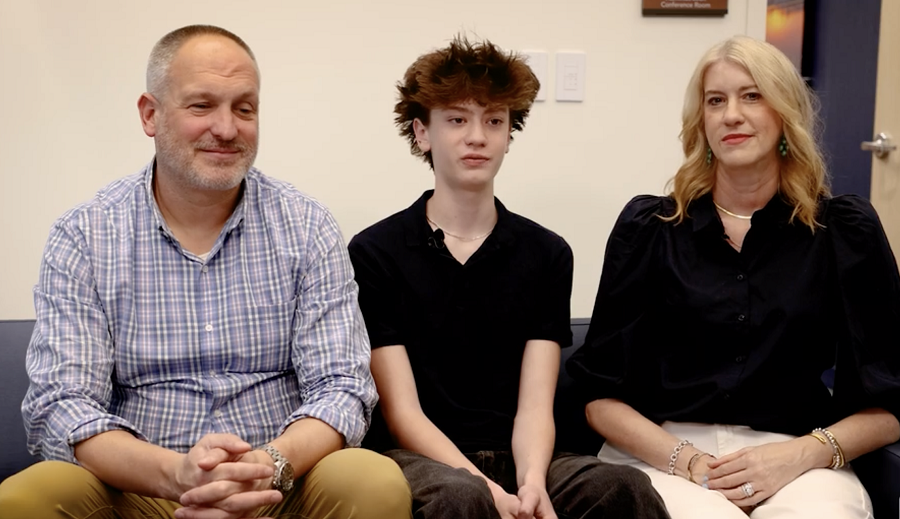- Community & News
- Service Line
An Unlikely Stroke Patient: Meet 13-Year-Old Multi-Sport Athlete Grant Dowling

Grant Dowling has always been a very active person. Throughout his 13 years of life, he has dabbled in many activities, and is even a multi-sport athlete through various school and club teams—basketball, ice hockey and beyond.
Grant’s highly active lifestyle would lead most people to the conclusion that he is living as a balanced and healthy young man… which he is. And that’s the scary part of his story, because a stroke can happen to anyone.
“It was like a normal day—I was about halfway through basketball practice and I got this sudden confusion,” Grant said of the very first of his symptoms. “I didn’t know where I was, kind of.”
Realizing he felt off-balance and trying to avoid fainting, he made his way unsteadily towards the water fountain for a drink.
“I tried to press the button, and I just couldn’t with my left arm,” Grant said about trying to use the fountain. And considering Grant is left-handed, this was especially concerning to him in that moment. It was then that he told his coach, who called his mother.
“I had no idea what I was walking into,” said Amy Dowling, Grant’s mother. “But as soon as I saw him, the confusion he had, his face was a little bit droopy and arm was numb—I was kind of thinking stroke, but it just seemed impossible.”
Despite how unlikely she thought it might be that her young, healthy and active 13-year-old son was having a stroke, she listened to her gut.
“I just thought these are the signs,” Amy said. “So I thought we need to get him to the hospital as soon as possible.”
It turns out, Amy’s instincts were correct. Grant was taken to Bethesda North Hospital’s Emergency Department, and he was immediately admitted upon his arrival.
“They saw the distress we were in with Grant and noticed his symptoms right away,” she said about the TriHealth emergency team. “He got the help he needed really quickly.”
Grant’s father, Greg, also left work to join his family at the hospital upon learning of the situation.
“He’s young, he’s healthy… how could he possibly have a stroke?” Greg found himself asking on the drive over.
Although this occurred at basketball practice, Grant does play multiple sports, including ice hockey. It also just so happens that his hockey coach is none other than Dr. Chris Zammit, TriHealth’s Medical Director for Stroke & Neuro Sciences Critical Care.
While he wasn’t who immediately treated Grant at Bethesda North Hospital, he was able to provide some much-needed information and guidance to the Dowling’s following the incident, including reassurance that Amy had done the right thing in getting him care as quickly as possible.
“When he first arrived, Grant was having what we refer to as ‘disabling symptoms,’” said Dr. Zammit. Disabling symptoms include severe motor weakness, aphasia and sensory loss among others. “Fortunately, when he finished initial treatment and imaging, his symptoms started to improve.”
“I was scared to death,” Amy said about the waiting process, though she never lost hope. “But he was in good hands, and we were just thankful they took it serious from the start.”
Grant will eventually be able to get back to everything he was doing prior to the stroke, but full recovery will take some time. Luckily, he’s found new ways to stay active in the meantime.
“I can’t have physical contact for a year period after having the stroke, so in November I can start doing sports again,” Grant said. That means ice hockey and basketball may be out of the question for now, but he isn’t staying shut in. “But I’ve developed other fun activities, like fishing with my friends.”
Greg is proud of the way his son has been handling the temporary sacrifice and says that he knows it’s all worth it—he just hopes Grant does too.
“Giving up a year of sports when you’re a kid probably seems like a lot,” said Greg of his son’s situation. “But in the long run, having a full and healthy life is certainly worth it.”
Related Articles
- Community & News
- Service Line
- Community & News
- Service Line